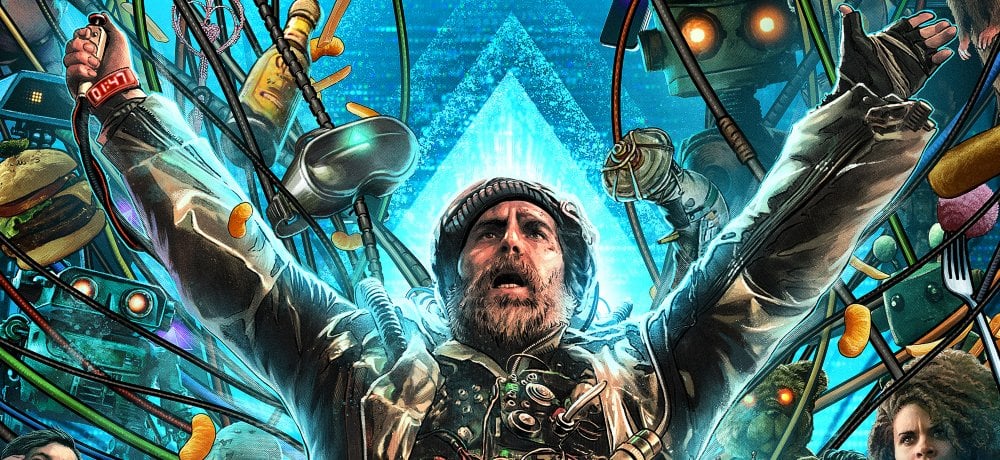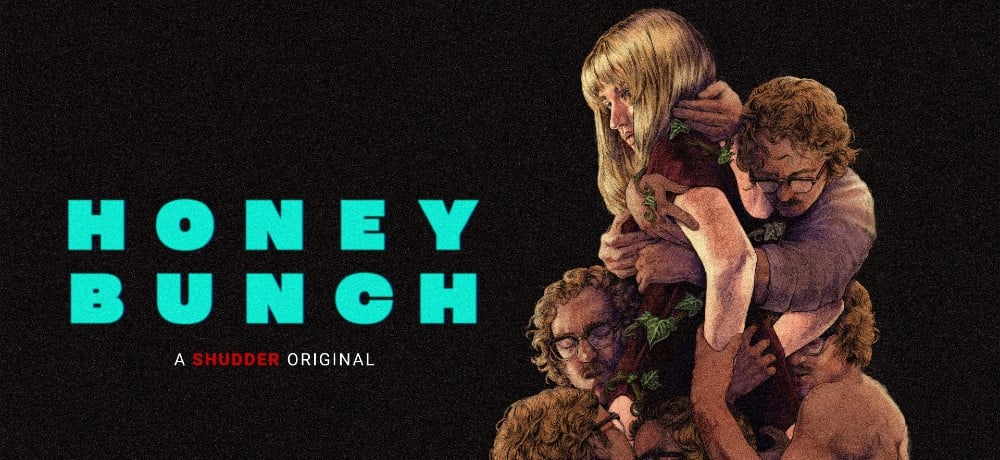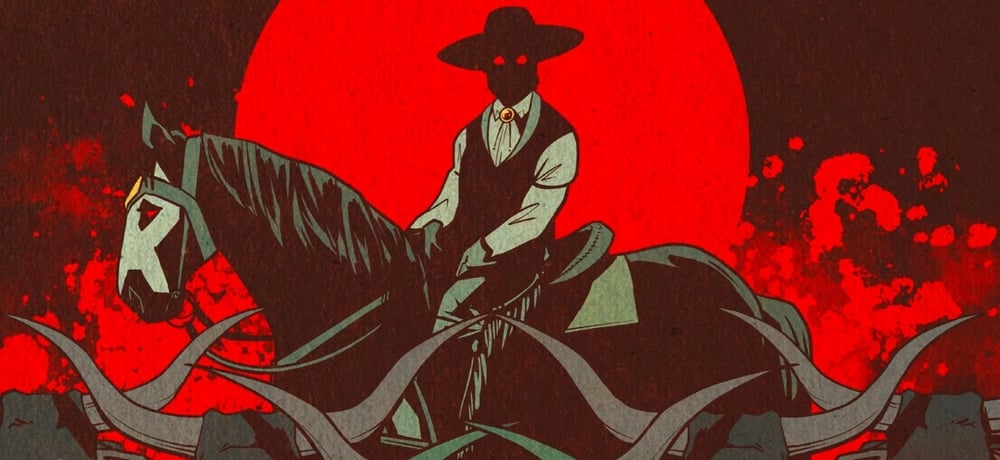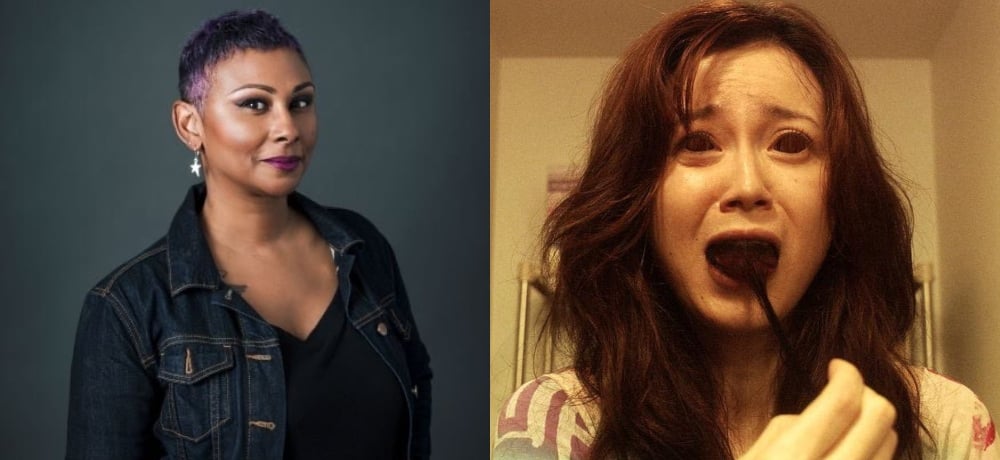






Welcome back to Let’s Scare Bryan to Death, where this month I’m talking to Carolyn Mauricette, who you probably know from a wide range of outlets. She’s the founder of View From the Dark, a site devoted to reviews and essays from people of color in genre film, she’s the Programmer for Canada’s Blood in the Snow film festival, and she’s contributed to The Encyclopedia of Japanese Horror Films and The Encyclopedia of Racism in American Films. And if that weren’t keeping her busy enough, she recently kicked off a new podcast called Reely Melanated with previous LSBTD guest Ashlee Blackwell.
When I asked Mauricette to nominate a movie for this month’s installment, she let me know she was in the mood for something absurd. Little did I know just how absurd, as I’d never heard of her selection, Hair Extensions (aka Exte in Japanese), a 2007 film from Japanese director Sion Sono. Hair Extensions follows a young woman named Yuko (Chiaki Kuriyama), an apprentice at a hair salon who has plans to become a renowned stylist.
Alas, two events throw rather large wrenches into this plan. First, her drunk, belligerent sister Kiyomi (Tsugumi) shows up one night with her young daughter Mami (Miku Sato) in tow. When Yuko realizes that Kiyomi has been physically abusing Mami, she decides to take Mami in to care for her. Second, she inadvertently gains the attention of Gunji Yamazaki (Ren Osugi), a troubled morgue worker who has an obsessive attraction to hair. Oh, and did I mention that Yamazaki recently found the corpse of a young woman who creates large amounts of hair, and that the hair extensions he sells from this corpse to local salons has a tendency to attack or possess anyone who wears them?
Needless to say, Hair Extensions checks the “absurd” box and then some. Mauricette points out that a lot of Sono’s work is pretty out there, as she remembers watching his earlier work leading up to Hair Extensions.
I had seen two other films of his, Love and Peace and Tag, I think it was during the same film festival... I think that was in 2015, and I kind of went on a binge... I don't know if you've ever heard of Suspect Video. It was an underground, kind of obscure rental video place and it was kind of a Mecca for all the horror people in Toronto. That's where you could find foreign horror, you could find all kinds of stuff. It was just incredible. We're still sad that it closed down. So I went there and I picked up a few movies. I think I picked up Strange Circus, which is completely... if you want a companion piece to go with the movie The Perfection, I would say watch Strange Circus. It's a lot, but it's a good companion film.
I can't remember what turned me on to Hair Extensions, but I think I just found it at Suspect, and I loved it so much I bought it, because it's one of the first horror films that I've ever seen dealing with the beauty industry. I used to be a makeup artist many moons ago, and I just kind of thought it was really interesting that he picked the thing that seemed so boring, like, “Oh, I'm gonna take hair extensions and turn that into a horror film.”
And the results are anything but boring. I never would have considered hair as a source for horror before, but Sono manages to make hair do some pretty gnarly things to people over the course of this movie. It yanks on people’s real hair. It grows and inserts itself into parts of the body you’d not think possible. It even pulls off a dismemberment or two. All of this is made worse for Mauricette given the fact that she’s got an aversion to hair.
A fun fact about me: I have a hair thing. I don't like it. I don't like seeing horror like The Grudge, where they're yanking hair out of their mouth. I find in most J-horror they have someone who's pulling a big wad of hair out of their mouth. I think this movie, actually this is one of the first J-horrors where they didn't yank it out. It was just growing out of the mouth. It wasn't so gross, it didn't look like they just pulled a clog out of a drain. So I guess maybe subconsciously I found this more watchable because the hair was nicely combed.
That the hair is so nicely combed may have connected to Sono’s critique of the unattainable standards perpetuated by the beauty industry.
Women are always like, “Oh, I'm gonna get my hair cut, I'm getting a wig, I'm getting a weave, I'm coloring my hair.” So that's a huge industry in terms of catching people and making them think that they need to do X, Y, and Z with their hair. So I think it was really clever he picked up on that beauty standard in the industry...Right now there's a movie called Bad Hair, there's Hair Wolf, and The Stylist, that short film. So now there's films like that, but I feel like this is the first film I've seen that really kind of corners that hair thing
Wrapped in this freaky tale about killer hair is a movie that explores damaged people, beginning with Yuko, whose life is turned upside down when she’s forced to take responsibility for her young niece, Mami. And as Mauricette explains, we also learn this situation reopens older wounds from Yuko’s past, as during a fight over Mami, Kiyomi reminds her that she once had an abortion.
I was thinking about how when Yuko was heading to work and she's narrating, like, “I ride to work! This is my town. I like going under the bridge!” She's rewriting her destiny, she's kind of creating her own fate. And then when her sister comes into the picture it kind of ruins everything, in a sense. I felt like that was really kind of an interesting and really strong trait for Yuko because she is actively trying to create her own fate and she's trying to make a life for herself. And her actually verbally dictating what she's doing, even though it's kind of like a running joke with her and her coworkers, it's kind of deeper when you look at it because she just wants to forget whatever led her to having an abortion. Because you don't know what happened. It could have been something more sinister. Maybe she was assaulted, maybe she had a love that didn't work out. And her sister throws it back in her face, like, “At least I didn't have an abortion.”
Her sister isn’t the only one who seems to lord position over her head. Her boss, who Mauricette points out named her shop Gilles de Rais after a French nobleman who is believed to have been a serial killer of small children, seems uninterested in her staff as actual humans, but more as cogs for her business.
You see how gung-ho Yuko is, she's like, “I'm gonna become a hair stylist. I'm gonna work hard.” And I think it was one of the first days she's at work, she's leaving and her boss is talking to two other hairstylists and she's telling them what they need to do to pass their hairstylist tests. And Yuko just kind of walked by and listened in. But instead of saying, “Hey, Yuko, do you wanna watch us?” She's like, “Can I help you?” But if she's so eager to learn, at least acknowledge that. That really bothered me. I was like, “Okay, that's how you are.”
Sono’s exploration of social hierarchy also blends in quite a bit of gender dynamics, as both Kiyomi and the hair-obsessed Yamazaki present antagonists that blend gender tropes.
Another interesting point is that if all the male characters are ineffectual dolts, [Yuko’s sister] kind of straddles that. She's kind of abusive and she's really pretty useless, but she's a female and then you have Yamazaki and he is a male, but he dresses as a female, and he's trying to kind of cross that bridge as well, so it really does play with a lot of gender. There's a lot of gender switching and role switching.
Yamazaki really is an interesting character to explore, as on one hand he’s an over-the-top creep, but at the same time there are some layers to the character that other directors may not have explored. Sono refers to Hair Extensions as the second movie of his “Pervert Trilogy.” While Mauricette and I agree that he’s got what you would consider an unhealthy relationship with hair, we’re not sure it’s necessarily sexual.
I feel like he's almost like a Gollum, it's like a prize for him. “Oh I've got this hair!” I think it gives him pleasure to be around hair, but I don't know if it's an erotic pleasure. Like, I love robots so my boyfriend got me Rosie from The Jetsons. There was like this special edition Funko set of Rosie, and there's three different colors of her, three little Funkos. And I just look at him like, “Oh, it's my collection!” I feel like that's the kind of pleasure he gets from it, so he has a collection.
When he finds that haunted corpse that grows hair, he's like, “Well, I can get her any time I want.” I don't think it's like a sexual thing. It's something that gives him this immense pleasure and joy. I bought the DVD a while ago and there's a whole separate DVD of special features... and they have all the actors talking about their roles. I know they talked to Ren Osugi, who plays Yamazaki, and he was saying he feels like the character is really lonely and he's trying to find something to connect with. And I think that's what comes across for me, is that he really connects with this. He said he finds this pleasure in hair, which is weird, but whatever floats your boat. However, he steals from corpses, so there's kind of an issue with that.
With those scenes depicting Yamazaki wearing more traditionally feminine clothes, I wondered if Mauricette saw that as Sono intentionally blurring gender lines in his creation of the character.
Looking at his library of films, I just feel like he does whatever, and I'm not sure he thinks about it too much... I just feel maybe that was just another way of Yamazaki to express himself. You notice there's a lot of women in that film, it's predominantly women. I think there's one male hairstylist, but it's all predominantly women. It’s an interesting point that you bring up, as I feel like maybe he's just trying to express himself because then it gets into a musical, so that's another way of him expressing himself.
Whether or not Sono intended to make Yamazaki gender fluid, it’s clear he doesn’t seem to think much of traditional masculinity based on how it’s represented, and that’s a theme Mauricette sees in several of his films.
I haven't seen Love Exposure [the third film in the Pervert Trilogy] but I have seen Strange Circus [the first movie in the trilogy]. In Strange Circus, I don't wanna spoil it for you, but there is kind of a gender surprise in that film, and also the main character's father is an incestuous monster, so I think maybe there is a running theme with him and men, dominance, power, and just being really nasty... I don't think he really holds men in a great light, to be honest.
Even with Yamazaki, there are more dominant men who abuse him in the film, as the detectives in the film often dismiss him and even rough him up in one scene.
They really do mistreat him. They're like, “Oh you're just a weirdo working in the morgue.” And he's actually the one taking in these dead bodies, so it seems like there is that hierarchy because he just takes dead bodies. And to them it's like, “Well we're detectives. We don't deal with people like you. You're just working with human trash.”
Mauricette really put Yamazaki in an interesting light during our discussion, as she opened my eyes to a more sympathetic reading for the character, who, although he serves as the film’s antagonist, is also clearly dealing with his own damage. He represents people living in the margins that, as Mauricette explains, Sono tends to focus on in a lot of his films.
You don't know what Yamazaki's trauma was, either... I think with [another Sono film] Love and Peace, he gives a great background to this guy who was seen as a really popular star and he's fallen from grace, and now he has to work his way back up. It's kind of like an underdog story, so I think he likes underdogs, he really focuses on the underdog story. So [in Hair Extensions] you’ve [got] Yuko, who's coming back from trauma, you've got Yamazaki, who is kind of a fringe dweller, and you have Mami, who is an abused child. So they all have like these narratives that are not similar, but they are in a way.